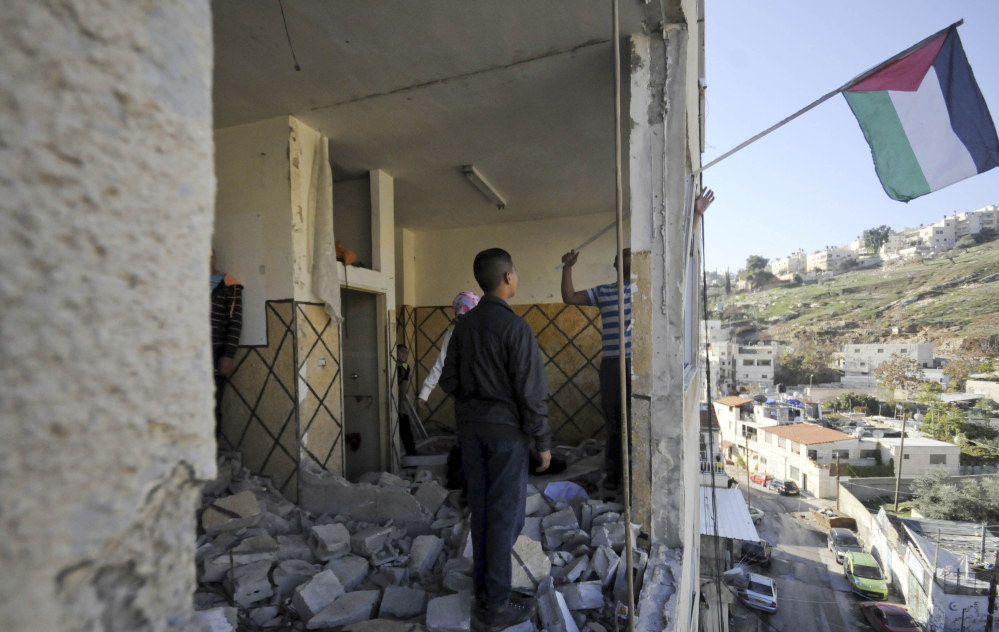JERUSALEM — Streets are subdued, marketplaces are quiet, and people are on edge in Jewish areas of Jerusalem, where Arabs have been using meat cleavers, guns, screwdrivers and even their cars in deadly, small-scale attacks.
The holy city – which Israel says must forever stay united – has rarely seemed more divided.
In their 47th year of occupation, Palestinians are seething with anger over neglect and discrimination, continued Jewish settlement in their areas, and a belief, despite official denials, that Israel is scheming to take over their most revered site.
This anger, coupled with Jewish fears of further violence, has left the city’s 800,000 residents apprehensive, seemingly united in the belief that things will get worse before they get better.
“I’m really not safe, and before leaving the house I think twice,” said Sara Levi, a 22-year-old stay-at-home mother.
“We are not calm, and we hope there is going to be an end to this, and that it is not just a beginning.”
FEWER PEOPLE RIDING TRAINS
Levi spoke as she waited at a stop for Jerusalem’s light rail train – a frequent target of Palestinian violence. The trains, meant to serve as a symbol of a united city, are frequently pelted with stones when passing through Palestinian areas.
There have been two deadly attacks in recent weeks by ramming cars into crowded stations.
In a separate attack, a Palestinian gunman on a motorcycle shot and seriously wounded a prominent Jewish activist who has pushed for greater Jewish access to the city’s most sensitive holy site – the hilltop compound known to Jews as the Temple Mount and to Muslims as the Noble Sanctuary.
The violence reached a new turning point Tuesday when two Palestinian attackers burst into a crowded synagogue during morning prayers, killing four worshippers and a policeman with the meat cleavers and gunfire.
It was the deadliest attack in the city since 2008, and gruesome pictures of blood-covered holy books and prayer shawls shocked a country long accustomed to political violence.
Those deaths brought to 11 the number of people killed by Palestinian attacks – most of them in Jerusalem – but also in Tel Aviv and the West Bank in recent weeks.
At least five Palestinians involved in the attacks were killed.
In Jewish parts of Jerusalem, traffic was lighter than usual Wednesday. Fewer people were riding the train, and the crowds that normally pack the city’s Mahane Yehuda open-air marketplace were thin.
“Business is weak today. It was worse yesterday,” vegetable salesman Itzik Shimon said as he stood at his empty stall.
“People are afraid. Can you blame them?”
SEEKING SAFETY FOR CHILDREN
In parliament, a group of mothers implored lawmakers to hire more security guards for day care centers.
The city says it has increased protection, but many kindergartens remain without guards.
“There was a feeling that with yesterday’s attack … terrorists are trying to send a message that they can get anywhere in Jerusalem,” said Dena Scher, a member of the group.
“Everyone is concerned.”
Scher, a mother of two young children, said her routine includes new precautions – such as standing away from crowds at bus stops.
“I’m definitely being warier, looking around more when dropping off or picking up the kids,” she said.
Send questions/comments to the editors.



Success. Please wait for the page to reload. If the page does not reload within 5 seconds, please refresh the page.
Enter your email and password to access comments.
Hi, to comment on stories you must . This profile is in addition to your subscription and website login.
Already have a commenting profile? .
Invalid username/password.
Please check your email to confirm and complete your registration.
Only subscribers are eligible to post comments. Please subscribe or login first for digital access. Here’s why.
Use the form below to reset your password. When you've submitted your account email, we will send an email with a reset code.